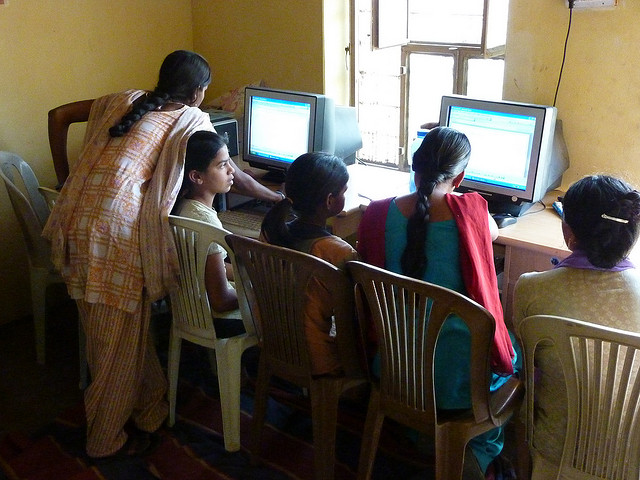By: Aamna Mohdin
Send to a friend
The details you provide on this page will not be used to send unsolicited email, and will not be sold to a 3rd party. See privacy policy.
Facebook recently visited India to host the first summit for its non-profit initiative Internet.org that it is spearheading with a coalition of technology companies in the hope of widening internet access in developing countries. [1] During the visit Facebook announced an ‘innovation challenge’ which will award US$25,000 to the developer of the best app, website or online service targeted at four marginalised groups in India — one of which is women.
But will such innovations really help get more Indian women online?
I spoke to Shivani Gupta, a programme associate for the Delhi-based non-profit organisation Feminist Approach to Technology (FAT). She says providing tools to facilitate internet access is a step in the right direction, but there needs to be significant investment in education to teach particular groups of women how to operate safely online.
“There’s a web of knowledge they’ve never had access to, so when they access the internet it’s like being on another world all together,” Gupta explains.
There are several reasons why some Indian women do not have access to the internet. Gupta works with women living in open slums in east Delhi, and there she says women are often prohibited from using technologies by brothers or fathers, and mostly access the internet from phones or laptops under their supervision. Gupta says some of this stems from a desire to control women, though it is also partly motivated by worries that women might develop inappropriate relationships online that could put them in danger.
She adds that cultural conditioning means girls in India are less likely than boys to be familiar with technology. “For example mobile phones are usually given to boys and not to girls, boys are given video games and girls are discouraged from touching technology as it’s often assumed they will break it.”
The local women who Gupta works with are unaware of dangers like phishing sites or getting involved with unscrupulous people on social networking sites.
But she thinks training and unrestricted internet access could make them more comfortable with the technology, allowing them to articulate their needs and own some technology for themselves.
Gupta’s FAT organisation has set up a ‘tech centre’ in New Delhi where women from the slums can learn how to use computers and use the internet safely. Places like this are rare in India “because most men and women have assumed that the internet is only beneficial for men,” says Gupta.
“Most men and women have assumed that the internet is only beneficial for men.”
Shivani Gupta, FAT
During training, women have the opportunity to explore ideas of privacy and consent and are warned not to share their passwords, contact details, or add strangers to some social media sites.
The second thread to FAT’s strategy is to help women when they encounter problems online. For example, Gupta says online sexual harassment is a significant issue for the women she works with.
“When women are sexually harassed online, this can be an incredibly scarring experience and it can discourage them for using [the internet] again. We need to have a strategy to deal with this,” says Gupta. FAT tries to help women deal with such experiences by giving them online projects, such as writing blog posts about their interests or to highlight the harassment they experienced.
She emphasises that overcoming the barriers to women’s internet access is crucial to give women a voice to direct the change they want to see.
Gupta cites the example of one girl at the tech centre who is hoping to become a professional photographer. She set up a Flickr account and uploaded her “amazing photos of the kind of inequalities that exist in the community. This led to discussions among the women at the tech centre about the disparities that exist.”
Aamna Mohdin is a freelance journalist based in London. @aamnamohdin
References
[1] Shilpa Kannan Internet.org wants to connect India's offline millions (BBC News Online, 21 October 2014)














